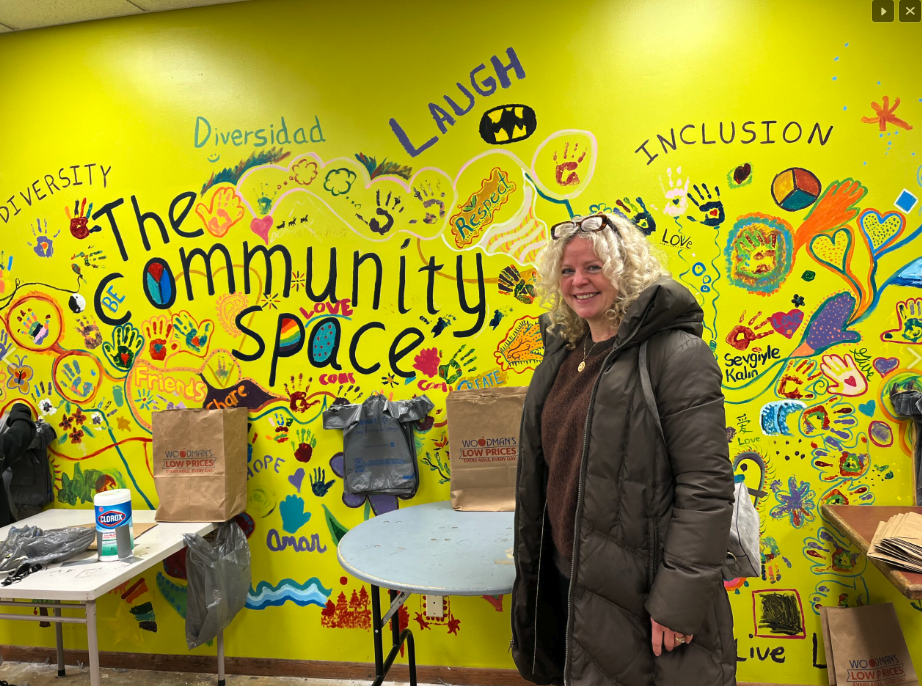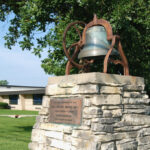Wisconsin Examiner, commentary: Political spin distorts Whitewater’s immigration ‘crisis’
- Home
- Wisconsin Examiner, commentary: Political spin distorts Whitewater’s immigration ‘crisis’

Wisconsin Examiner, commentary: Political spin distorts Whitewater’s immigration ‘crisis’
Editor’s note: the following commentary has been published with permission from the Wisconsin Examiner. The publication’s website is here: https://wisconsinexaminer.com.
By Ruth Conniff/Wisconsin Examiner
A few days after Whitewater Police Chief Dan Meyer wrote to President Joe Biden asking for federal aid to help cope with an influx of recent migrants to his city, the right-wing news outlet Breitbart jumped on the story, publicizing the letter under the misleading headline: “Biden floods small Wisconsin town with 1,000 migrants.”
This was just one of many distortions of Whitewater’s immigration “crisis” peddled by conservative media and Republican politicians over the last few months.
As Meyer explained in his Dec. 28 letter to Biden, migrants from Nicaragua and Venezuela have been arriving in Whitewater over a period of years.
But that fact didn’t stop U.S. Sen. Ron Johnson and U.S. Rep. Bryan Steil from comparing Whitewater to big, Democratic-voting cities that have had a total of 80,000 desperate asylum seekers dumped on them by Texas Gov. Greg Abbott who has packed them off directly from the U.S./Mexico border on buses and airplanes to overwhelm northern cities’ services.
In a November press conference, Steil tied the migrant population in Whitewater to U.S. border security. “It’s having a serious and substantive impact here in Whitewater. The answer to that is to secure the U.S./Mexico border.”
“They said it’s going to bankrupt New York,” Johnson added. “Well, the national media pays attention to the big cities, but we’re paying attention to what happens here in Wisconsin, to a city like Whitewater, to a county like Walworth, and it’s devastating, and it’s a growing problem that has to be dealt with.”
On Friday, a group of Republican state legislators sent their own letter to Biden, demanding urgent action on what they characterized as a surge in violent crime in Whitewater “including numerous sexual assaults and sexual assaults of juveniles, a kidnapping and the tragic death of an infant child.”
“We believe that taking a more decisive approach to secure our nation’s southern border will not only alleviate challenges in Whitewater, but also contribute to a secure environment for citizens nationwide,” Reps. Ellen Schutt, Tyler August and Scott Johnson wrote.
It was the latest salvo in a political war over U.S. immigration improbably centered in a small college town in southeastern Wisconsin.
‘They’ve been here for a while’
Sitting in the Sweet Spot cafe on Whitewater Street last Saturday, city council member Brienne Brown shook her head, bemused by the political storm that has descended on her town.
“I do want to impress upon you that they’ve been here for a while,” Brown said of Whitewater’s immigrant population. Brown’s district is right in the center of the city, and includes a lot of the rundown rental properties that traditionally housed UW-Whitewater students. Lately, the same properties are housing many of the estimated 800-1,000 immigrants and asylum-seekers, mostly from Nicaragua, who arrived during the pandemic when in-person classes were shut down and the students moved away. Brown noticed the transition while knocking on her constituents’ doors over the last several years, she said.
“No one really knows the reason for the increase in Nicaraguan refugees,” Whitewater school board member Miguel Aranda told me on the phone. “But I’d argue the employers in our area are the reason. There’s a labor shortage.”
Aranda’s Mexican-American family has lived in the area for decades and originally came to Whitewater for work. “The moment they learn there’s an employer looking for workers, people come,” he said.
Immigrants make up a significant part of the workforce on the farms surrounding Whitewater in rural Walworth County, where dairy cows and fields of grain and vegetables are tended by immigrant workers.
A recent Pro Publica investigation explored how this mostly undocumented workforce is cast aside without compensation or medical care when workers get injured on the job. It featured a dairy worker from the Walworth area who said he was fired and thrown out of the house where he lived when he got frost bite on his hands working outside in the bitter cold.
“Personally it’s hurtful when you hear this kind of rhetoric,” Aranda said of the alarmism about the new immigrants in Whitewater. As a school board member, he worked on creating a multilingual curriculum. “There was some pushback at the time, but it passed,” he said. “The majority is very welcoming of the immigrant community.”
Because of the university campus, Whitewater is a diverse city, with residents from all over the world, Aranda pointed out.
Aranda was annoyed that neither he nor any other local Latino official was invited to the November press conference on immigration with Johnson and Steil. And he was taken aback when, during that event, Johnson pressed for the number of Spanish-speaking students in Whitewater schools, suggesting that it shows the scale of the problem with immigrants coming to the city. “He’s counting my three kids!” Aranda exclaimed. “We are U.S. citizens. That made it really personal to me — targeting the Latino population that’s been here for years.”
Police chief’s message doesn’t line up with Republicans’
Unlike the Republican politicians who have been making political hay out of his letter to Biden, Whitewater’s police chief took pains to state in the letter that “none of this information is shared as a means of denigrating or vilifying this group of people. … In fact, we see a great value in the increasing diversity that this group brings to our community.”
“Our officers have also seen first-hand the terrible living conditions that many migrants are living in,” Meyer stated in the letter, which asks for money to beef up the police force, hire an immigrant liaison, and to pay for a ride-share program, affordable housing and language instruction. “We simply need to ensure that we can properly serve this group and the entirety of the community,” he wrote.
Nor does he claim that there is an immigration-related crime wave in Whitewater. “We are a safe community,” he told the editor of the community news outlet WhitewaterWise.
The handful of scary incidents mentioned in the Republican legislators’ letter, which included a domestic violence case involving rape and the case of a pregnant woman who abandoned her newborn baby in a field, have more to do with inadequate services than an influx of violent criminals, city council member Brown said, adding, “It’s not like people are wandering around town raping people.”
The majority of the uptick in crime is associated with a massive number of unlicensed drivers the police have been pulling over.
“We have found approximately three times the number of unlicensed drivers on our roadways compared to previous years,” Meyer wrote in his letter.
One thing that would help, Meyer has said in several interviews, would be for Wisconsin to allow undocumented immigrants to get driver’s licenses. That would significantly reduce the burden on local cops who are overstretched with all this license enforcement and help them to know whether drivers are likely to be dangerous criminals or just farm workers trying to get home.
Republicans in the Legislature have resisted restoring driver’s licenses to undocumented immigrants — which the Legislature took away under a 2007 law — despite studies showing that doing so would save Wisconsinites millions in insurance payments and make the roads safer for everyone. Wisconsin is one of 31 states that denies driver’s licenses to undocumented drivers.
“My preference would be to have an avenue so that they can study for, successfully pass a written test and show that they can pass a driving test,” Meyer said in a live interview with WhitewaterWise on Monday. “And if they can do that, I would much prefer to have them have the ability to legally drive rather than not having that.”
In fact, most of the problems the city faces, which prompted Whitewater’s request for emergency federal aid, has a lot more to do with Wisconsin’s Republican-led Legislature than either a “flood” of migrants or Joe Biden.
Republican-caused problems
Whitewater is a poor town with a median income of $46,000 and a 32% poverty rate, and a UW college campus that doesn’t pay property taxes.
As Meyer and City Manager John Weidl explained in their live interview Monday, the city of 15,000 was one of the big losers in the state’s recent shared revenue deal. Unlike Milwaukee, Madison, and tiny communities throughout the state, Whitewater did not get a big shared revenue bump from the state. Adding insult to injury, the state’s reimbursement for municipal services was reduced by $185,451 in 2022 because of a shared services agreement the city has since canceled with UW-Whitewater. The total increase for police this year, Weidl said in the interview Monday, was zero.
“I don’t think the state is doing everything it can to assist us,” Weidl said.
Despite their pro-police rhetoric, Wisconsin Republicans have been defunding the police in communities across the state for decades, the Wisconsin Policy Forum reports, through a combination of property tax limits and low state reimbursements to municipalities that have forced cuts to law enforcement.
On the broader issue of immigration, Republicans in Congress, instead of running to the border for photo ops and spreading hysteria about a wave of violent immigrants, should sit down and start fixing the problems with our immigration system.
Hiring immigration judges and speeding up processing of asylum applications, which can take as long as seven years is one needed reform. An even simpler matter is getting rid of the nonsensical rule that bars asylum seekers from legally working for 100 days after they arrive in this country.
Despite all the letters going to Biden, “What the President can do is limited,” U.S. Rep. Mark Pocan (D-Town of Vermont) told reporters gathered in his office last week for a general briefing. “Congress has to act on immigration. And that’s why I think there’s a reason why they didn’t act in the two years that they had a House Republican majority, a Senate Republican majority and a Republican president — because this is a political issue that’s good for them.”
Whitewater a welcoming place
On the local level, Whitewater’s problem, say Meyer, Weidl and Brown, comes down a lack of money.
But people in Whitewater are “incredibly generous and welcoming,” said Brown, who moved here from Texas 11 years ago and found herself warmly embraced by a community that prides itself on community service and volunteerism.
“They want these people to live here and want to be a diverse community,” she said. “In general we have a community that’s very supportive.”
In his letter, the police chief also alludes to that community support, crediting nonprofit groups in town that have “taken great strides in providing [migrants] with basic essentials like clothing and medical care.”
That spirit was on display Saturday at The Community Space, a large building donated by a local resident where volunteers offer food, clothing, furniture and English classes, all for free. “No appointment is necessary. No documentation/proof of anything is needed,” the center’s Facebook page states in English and Spanish.
Kay Robers, a white-haired woman with a brilliant smile, greeted a steady stream of Spanish-speaking families as they arrived, sitting behind a desk surrounded by Christmas decorations and bowls of candy, with two large cats sleeping in baskets beside her.
José Valentín, a 31-year-old immigrant from Mexico, first came to the Community Space for English classes. Now he volunteers on Wednesdays and Saturdays. “The people here, they need translation,” he said.
Valentin came to the United States 12 years ago to work on a dairy farm. Now he works at a local spice factory and has saved enough money to purchase his own home through a first-time home buyers program.
“I like life here,” he said. “I have a good life, thanks to God. I’m paying for my house. I’m paying less than I was when I was renting.”
His sister and brother and their children also live in Whitewater. Valentín goes to church with them on weekends. “I’ve seen a lot of people arriving from Nicaragua,” he said. “It’s hard for them because Whitewater doesn’t have enough living space. They share rooms with a lot of people. Two bedrooms cost $900 a month.”
In addition to housing, low wages and the long wait for work permits is the biggest immigration “crisis,” in Valentín’s view.
‘There are a lot of people who have good hearts. They want to help.’
“It’s a contradiction that the government is against the use of fake documents but won’t give us documents to work legally,” he said. “On the farms, the workforce is about 90% Hispanic. A lot of people in this country didn’t want to work during COVID. But the Hispanic community ‘had’ to work. We didn’t have any check coming in.”
Nicaraguans now comprise about half the congregation at the Centro de Fe Cristiana, he said, where Valentin and his family go to services. Some of the new arrivals have told him how they came to the U.S. fleeing repression and violence. “They can’t walk freely in the street at home,” he said. “There’s a lot of repression by the police.”
“New people who arrive need the basics,” he said. “I like seeing how the community helps. You can get clothes, furniture, TVs, sofas, beds — a lot of things that are simple necessities.”
It’s been satisfying, he said, to be able to help.
“There are a lot of people who have good hearts. They want to help. And the people who come here are also grateful.”
There’s no question that 800-1,000 migrants moving into a relatively poor Wisconsin town of 15,000 has put a strain on city services. But despite the sensationalism about violence and chaos spilling over the border, the community’s reaction to the new arrivals seems positive.
“There are things we can do,” says Brown. “We just need a little bit more manpower and a little bit more money.”

Whitewater city council member Brienne Brown at The Community Space in Whitewater. Photo by Ruth Conniff.

José Valentín volunteers at The Community Space in Whitewater, helping recent immigrants access free food, clothing, furniture and English classes. Originally from Mexico, Valentín moved from working on a dairy farm to a spice factory and recently purchased a home. He says it makes him feel good to be part of a community that is dedicated to helping people. Photo by Ruth Conniff.
This post has already been read 1141 times!
Kim
2 thoughts on “Wisconsin Examiner, commentary: Political spin distorts Whitewater’s immigration ‘crisis’”
Leave a Reply Cancel reply
Our Advertisers
Most Read Posts
- Our Take: If secrecy is embraced, transparency is disabled

- Eight finalists make the cut in Whitewater WindUp competition; winner to be chosen May 18

- DOT: Two-phased improvement project slated for highways 11 and 12 in Walworth County

- Roundtable presenter shares affordable housing designs, cost-reducing construction options

- Commentary: Remembering journalist Sam Martino

- DOT: Department revokes three Elkhorn wholesale dealers' licenses

- BaristaCats Cafe takes first place in Whitewater WindUp competition

- UW-Whitewater May 2024 graduates receive degrees

- CDA recommends approval of 128-unit multifamily development on Moraine View Parkway

- Food drive to support local pantries to be held Saturday

Categories
- Advertisers
- Area events
- Art, culture
- Business
- Community
- County
- Crime, court
- Culture
- Diseases
- Economics
- Food
- Government
- International
- Law and Court
- Lifestyle
- Obituaries
- Opinion
- Police, fire, EMS
- Religion
- School
- Science
- Technology
- Today's features
- Today's news
- Top Stories
- Travel
- Uncategorized
- University
- World













One can show love and compassion for our newcomers and still want our community to be safe. This, yeet another rant, against the police is much like the devouring mother that refuses to punish her spoiled child.
These people need to grow up. The comment about the median income being $46k is very misleading. This number is due to so many houses housing college students (that do not have income). Platteville and other similar cities have the same numbers. Whitewater, in fact, receives millions of borrowed (student loan) dollars (that may honestly never be paid back) from students. It is a huge influx of cash. So let’s not be victims.
Uncontrolled illegal immigration in Whitewater has;
1. Driven poverty way up,
2. Driven crime way up,
3. Driven Child Protective Services calls way up, and
4. Driven school academic achievement way down.
The purposeful omission of these facts is its own political spin.